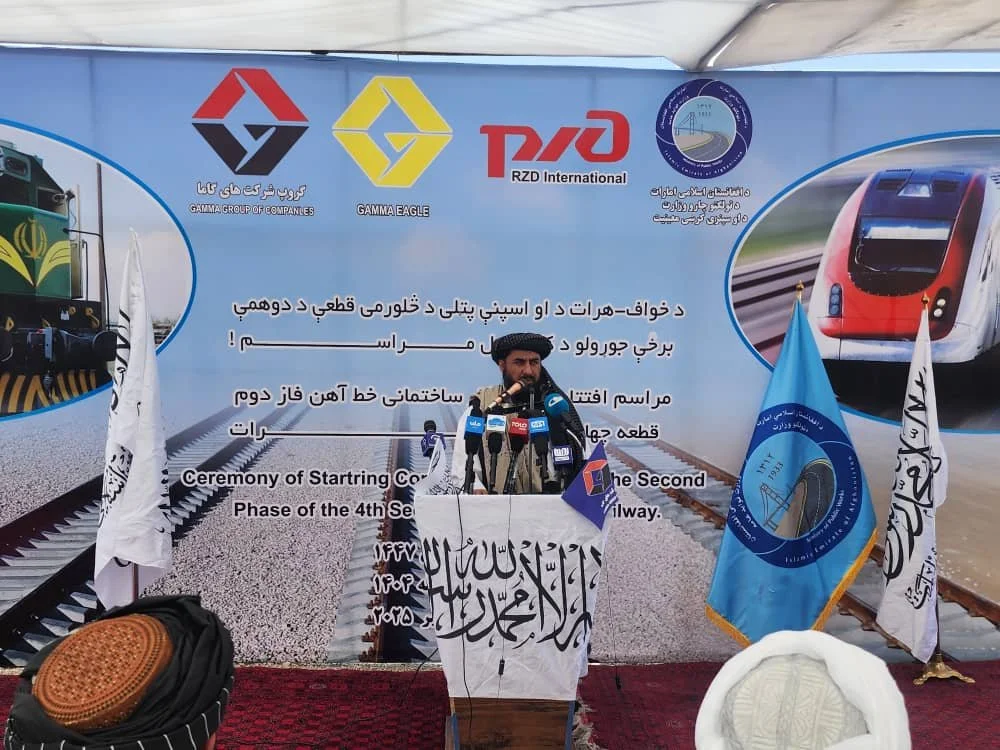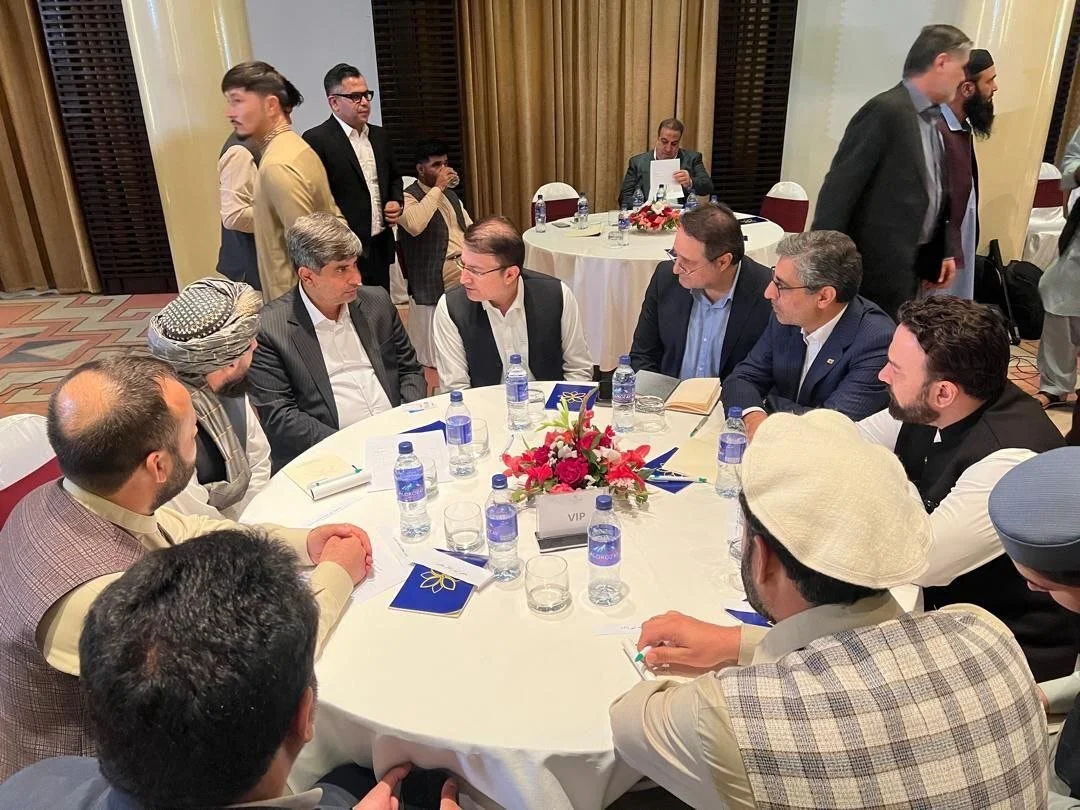The Khaf-Herat Railway: Summary Of Latest Developments
By Sophia Nina B-A
On the 14 September 2025 construction on the final phase began.
The Afghan Ministry of Public Works and the Herat provincial government have formally launched construction of the final Stage 4 phase of the Khaf-Herat railway (read here for more on the background!).
Stage 4 is being built in two phases, with the 43 km Phase 1 from Roznak to Robat Paryan reported to be more than 90% complete. Construction of the 47.3 km Phase 2 from Robat Paryan to the Herat industrial area and airport was launched with a ceremony on September 14, and completion is expected within two years.
According to Railway Gazette, ‘Stage 4 Phase 2 is being built by Afghan conglomerate Gamma Group with the support of Russian Railways subsidiary RZD International under a contract signed on March 28 2024.’
More details was revealed in the official ceremony post published by the Afghan Ministry of Public Works as to how the Taliban government plans to finance the construction of the railway line:
The US$54.6m project is being financed domestically by the Ministry of Mines & Petroleum, which in January 2025 granted Gamma Group’s mining business Gamma Eagle rights to extract lead and zinc at Sarsarkhak in Yakawlang district in the northwestern part of Bamyan Province in return for commitments including constructing Stage 4 Phase 2 of the Khaf-Herat railway and building a hospital in Wardak.’
The cost and benefits was also underlined by the Minister:
At the kick off ceremony the Afghan Deputy Minister of Railways Mawlawi Mohammad Ishaq Sahibzada stated that ‘expanding the rail network is of strategic significance, and the Khaf-Herat railway line would make Afghanistan a crossroads linking Central Asia, South Asia and the Middle East.’
According to the Herat Governor Sheikh Maulana Islam Jar the project ‘would help transform the city into a bustling transit hub,’ while Mohammad Nasir Amin, Head of the Herat Chamber of Industries & Mines, said the Khaf-Herat railway project would ‘cut the cost of transporting a tonne of freight from the Iranian port of Bandar Abbas from US$130 or more by lorry to US$40 by rail.’
Source: Official Twitter Page of the Afghan Ministry of Public Works
15-17th September 2025 - A senior Iranian delegation, led by Iran’s Minister of Industry, Mines and Trade Mohammad Atabak, carried out a 3-day visit to Afghanistan to inspect the progress of the Khaf-Herat Railway, discussing iron ore mining and utilising Iran’s Chabahar port.
The delegation consisted of senior Iranian government officials from the Ministry of Intelligence, Alireza Bigdeli Iran ambassador to Afghanistan, Ali Hakami Ghasemi, director general of the Eastern railway branch of Iranian Railways, the national railway operator, Dr Amir Tavakoli, the representative of Khaf and Rashtkhar in the Islamic Constitutive assembly, and heads of Iranian private sector mining companies. This included, Saeed Zarandi, CEO of Mobarakeh Steel Group, Iran’s largest steel company and Ali Rasoulian, CEO of Sangan Steel Mining Industries Company, an iron ore mine operating in county Khaf, in Razavi Khorasan province, Iran.
Three agreements were reportedly reached. These include:
Plans to construct a processing plant in Afghanistan for iron ore and other minerals, the specifics and time frame of the plant was not disclosed.
Iran’s Minister of Industry, Mines and Trade Mohammad Atabak and Nooruddin Azizi, Minister of Industry and Trade of Afghanistan agreed to establish a joint Iran-Afghanistan special mining economic zone at the border in Shamtig to remove custom and banking barriers.
Atabek and Azizi also agreed to plan further mining partnerships in Ghorian district of Herat.
Outside the agreements, developing transport infrastructure, joint mining capacity building, linking Afghanistan with the Iranian Chabahar Port, future plan to link the Khaf-Herat railway with the existing railway from Mazar-Sharif-Termez (Afghan/Uzbek border),and increasing mineral exports were discussed:
A joint meeting was also held between the Iranian delegation and Abdul Ghani Baradar, Deputy Prime Minister for Economic Affairs of Afghanistan, and key Afghan ministers of the from Industry and Trade, Mines and Petroleum, Energy, and Public Works.
In this meeting, issues such as promoting trade and rail transportation, developing banking cooperation, utilizing Chabahar Port infrastructure, increasing the exchange of goods via the Khaf-Herat railway route, and mineral cooperation in the exploration and extraction sector were discussed.
The Iranian delegation continued its trip to Herat for government and private sector meetings. They then returned to Iran via the Khaf-Herat railway line. The program ended with a field visit to the Shamtig cross-border railway station, built specifically for the Khaf-Herat railway line
The delegation also visited Balkh province to see the existing rail line that runs from Mazar Sharif (Afghanistan) to Termez (Uzbekistan).
The Mazar Sharif-Termez railway line is part of the planned Trans Afghan railway project between Uzbekistan, Pakistan and Afghanistan.
Iran aims to connect the Khaf-Herat railway to the Mazar Sharif rail line and onwards to Uzbekistan and the wider Central Asia region.
During the Iranian delegation’s visit, the Taliban deputy governor of Balkh stated that the Taliban will provide security guarantees and full support to infrastructure projects.
Source: Khabar news, an Iranian news outlet.
19 September 2025 - Jabar Ali Zakeri, CEO of the Islamic Republic of Iran Railway Company stated that the planned passenger service between Khaf-Herat has been delayed due to border problems. Currently only freight trains run through the partially built Khaf-Herat railway.
19 September 2025 - Arrival of Iranian railways experts to inspect progress on the Khaf-Herat railway project
A delegation consisting of representatives of the Islamic Republic of Iran Railways, the country's Ministry of Foreign Affairs, and members of the Afghan Railway Consortium, a private joint-stock company established in December 2022 to manage the Khaf-Herat railway (I explain more about what this is here) arrived in Herat city on Friday, September 19.
The delegation was welcomed at the Herat airport by the Deputy Consulate General of Iran and representativs of the Herat provincial government .
20 September 2025 – Afghanistan’s Deputy Prime Minister for Economic Affairs, Mullah Abdul Ghani Baradar Akhund approved a draft policy on ‘processing and export of minerals’ and ‘a plan for constructing laboratories at key border ports.’
According to Akhund’s press office statement ‘the objective of the policy was to facilitate mineral processing in line with national and international standards, attract domestic and foreign investments in the mining sector, enhance coordination between relevant institutions on mineral processing and exports, ensure easier access of mineral traders to regional and global markets and create employment opportunities within the country.’
The draft policy will now go to the Leader of the Islamic Emirate of Afghanistan (IEA) for final approval (see below where I explain the current state of the Afghan policy making process)
A little note about the current policy making process in Afghanistan
For reference, the Taliban government does not have a formal policy-making process.
The Taliban abolished the legislative branch when they came to power in 2021, so all previous laws no longer exist. The Taliban-led government have since adopted two ways of turning a bill into law (so to speak).
The first and most common way is that the Office of the Supreme leader of the IEA, Hibatullah Akhundzada, rules by decree, often ad hoc, often communicated orally or in notes that are not published and without any formal consultation process or interministerial coordination.
A second way, is that representatives from a select ministry (e.g Ministry of Mines and Petroleum or the Ministry of Public Works) present a draft policy to the government’s Economic Commission, a type of regulatory body, headed by the First Deputy Prime Minister, Mullah Abdul Ghani Baradar, with specific proposals that are evaluated.
After the evaluation it is then sent to the Supreme Leader (referred to in the policy documents and official publications as ‘Amir al-Mominin’, which is the religious title), who then either approves or disproves.
The decrees can be specific instructions, such as appointing senior officials or statements dealing with broader issues that are often vaguely formulated.
The same process happens when a company is interested in obtaining mining rights or an international company wants to enter the market; the companies typically contact the Economic Commission with their proposal which is then evaluated and then sent for approval to the Supreme leader’s office.
If it is a domestic company, then licenses, permits or official registration is often granted based on verbal instructions from the leader of the Supreme leader’s office.

